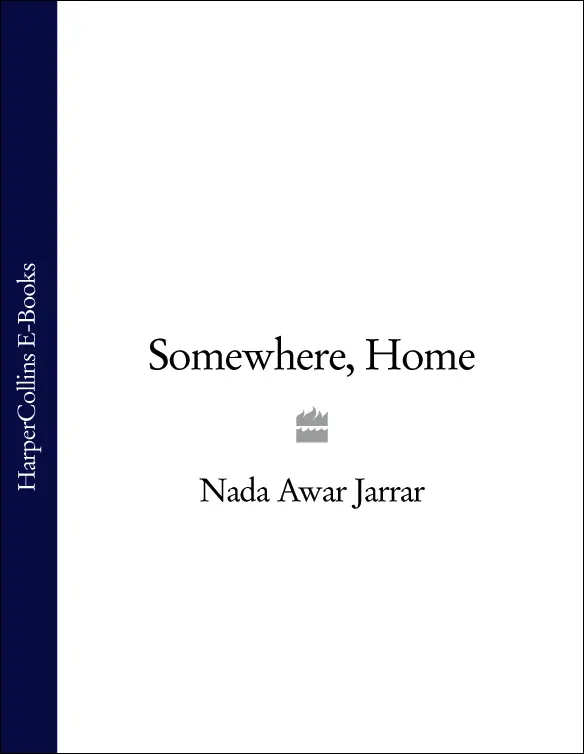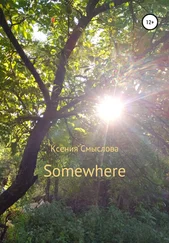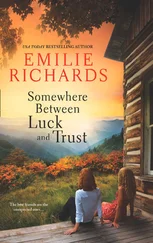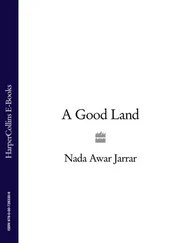
NADA AWAR JARRAR
Somewhere, Home

For my family
Contents
Cover
Title Page NADA AWAR JARRAR Somewhere, Home
Part One
Maysa
Alia
Maysa
Saeeda
Maysa
Leila
Maysa
Maysa
Part Two
Part Three
Also by Nada Awar Jarrar
Copyright
About the Publisher
Part One
Maysa
Winter
This house, my house, saw its beginnings with the marriage of my grandfather. Built to hold the family in its overflowing numbers, the house became a meeting place for grandparents, aunts, uncles, children and numerous cousins from surrounding villages, its rooms expanding around them like sunlight in winter.
My father, Adel, remembers its high ceilings, the echo of footsteps on bare tiles and glimpses of his mother’s long white veil floating through doorways behind her. At three, he once sat on the outside ledge of one of its arched windows and gestured towards the fields beyond, his own private kingdom, before falling into a prickly bush below and getting up a more humble boy. I remember, as a child, holding my hand against the hollow in my father’s scalp and imagining I could feel the memory of that fall between my fingertips.
He would call me to him, ‘Maysa, Maysa’, and speak to me of his life in this house in fragments, in snatches of colour and longing, pausing to be the distant and more familiar figure of my childhood. But he did not know that it was his silences that intrigued me most, those moments between words that allow the imagination to wander.
I saw the brown dust of unpaved roads wrapping themselves round the mountain like arms entwined. I saw the sun on those roads and the air that carried it. I saw stone houses and armies of men and women in black and white sitting in front of them, their hands spread fanlike on their knees, their eyes squinting in the sun. I saw my grandparents, Alia and Ameen, and their five children sitting on low seats round a wood-burning stove in winter, their cheeks flushed red, their hands reaching towards the warmth, their voices low and intimate.
Now, years after they have all gone, as Beirut smoulders in a war against itself, I have returned to the mountain to collect memories of the lives that wandered through this house as though my own depended on it. And as my heart turns further inward, I nurture a secret wish that in telling the stories of those who loved me I am creating my own. The village hangs against the side of a mountain. The mountain grows pine trees and wild thyme, and is no longer home to wild boar and wolf dogs. My grandmother told us, as children, of the famine that struck during the Great War and the fear felt by men walking through the night with sacks of Damascene wheat on their backs, watching for animals that might attack.
The mountain seems tame now by comparison. I stand at the front door and stare lazily into the garden. It is almost autumn, almost cold, almost the end of freedom and summer. At five o’clock the mist appears and hangs listlessly over the house, over its crumbling red-brick roof and around its jagged stone walls. It floats over fig trees and grapevines, and ripens waiting fruit until it is ready for picking. I touch the vine that hangs from the roof and winds its way through the pointed arches that frame the front of the house. It runs along the rusty green balustrade at one end of the terrace overlooking an empty field and the village beyond, and edges towards the faltering wooden front door.
Since my arrival several weeks ago, I have been busily preparing for the cold winters that invade the mountain. Most of my things are now in the large room adjoining the kitchen. My bed is tucked into one corner with a large sofa across from it, and in between them is a Persian carpet woven in red geometric patterns that once belonged to my mother, Leila. Lined up against one of the walls is my grandmother’s oak dressing table which has a full-length mirror stained with age and a secret drawer that no longer opens.
In the centre of the room I have installed the old wood-burning stove where I will boil water for bathing and do most of my cooking throughout the winter months. The kindling wood and dry pine cones are in a large tin container next to the stove and the blocks of firewood that I bought last week are piled high behind the door. The kitchen cupboard is stored with jars of pickled cheeses and green olives, and cloth sacks filled with cracked wheat, lentils, beans and pine nuts line its shelves.
The weather gets colder. I spend much of my days wrapped in blankets sitting on the sofa with a large notebook and sharpened pencils in my hand. When the stove heats up, I breathe in the green scent of burning pine until my head swims with it. Then the notebook slides to the floor, the palm of my hand opens to release the pencils and the words escape and float up to the high ceiling.
In the early evenings I watch the short-lived sunsets, not with a dreaminess, but in a slow and deliberate way, until the sun becomes a part of me too, going down in a blaze of red. Everything beckons me then, the pine trees, the stars and the singing crickets.
At night, when the village falls silent, I sit in my room and listen to the now familiar creaks and sighs of this house and revel within its reluctant embrace. If sleep does not come easily, I lie in my bed and try to imagine old age and loneliness enveloping me, getting closer and closer until they touch my skin and there is no running away from them.
Selma, the midwife, has become a regular visitor. A tall, dark amazon in whom wisdom sometimes outweighs kindness, Selma is a second cousin once removed and chooses to remain in the village because ‘the world out there is no better’. She cares for me as she would an errant younger sister who does not really deserve her sympathy. She does not ask me about Wadih, the father of my child, nor why I decided to return to the mountain after a lifetime in the city. During her morning visits we drink tea made from dried flowers and herbs, and nibble flat, hard biscuits flavored with cardamom and musk. Because I am thirty-two, Selma wants me to be examined by a doctor, but I tell her that my confidence in her abilities is so great that I am certain nothing will go wrong on the day.
After six years of marriage Wadih and I had both given up hope of having a child when I discovered I was pregnant four months ago. For several weeks I lived through something close to stupor, unsure whether to be happy or shocked and sensing in my husband an equal uncertainty. As we slept, exhausted with thinking, his body stretched itself so that it seemed somehow to pass over me, his breath like slow mist in the evening. I stared at him and pressed my hand to his brow, and wished he would wake up and catch me watching him.
‘This city is no place to bring a child into,’ I told my husband.
‘What do you mean?’ There was indignation in his voice. ‘This is our home, Maysa.’
‘What about the fighting? What if something happens to the baby because of this wretched war?’
‘Our baby will be as safe as every other child in Beirut.’
I thought then how lonely a man seems when he is alone, the hesitation in his step, his brows pushed up in astonishment at the finality of solitude, his heart ready to embrace the first curious look, the first hand touching, willing to touch.
Читать дальше














